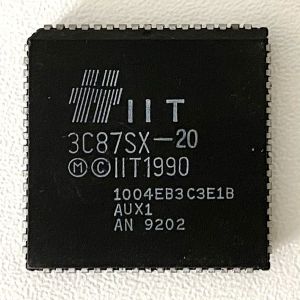Difference between revisions of "IIT 3C87SX-20"
(Created page with "thumb|IIT 3C87SX-20 processor (front) thumb|IIT 3C87SX-20 processor (back) The IIT 3C87SX-20 is a math...") |
|||
| Line 4: | Line 4: | ||
The IIT 3C87SX-20 is a math coprocessor and was designed to work with an Intel or AMD 80386SX processor. It is a special version of the IIT 3c87The main CPU is able to offload floating point arithmetic operations to this coprocessor, so that overall system performance can improve during processor-intensive tasks involving these types of calculations. | The IIT 3C87SX-20 is a math coprocessor and was designed to work with an Intel or AMD 80386SX processor. It is a special version of the IIT 3c87The main CPU is able to offload floating point arithmetic operations to this coprocessor, so that overall system performance can improve during processor-intensive tasks involving these types of calculations. | ||
| + | This 32-bit chip was introduced in 1989, came with core frequencies of 16, 20, 25 and 33 MHz, and had a PLCC-68 package type. This particular unit is manufactured in week 2/1992. | ||
| − | + | === Coprocessors === | |
| + | Before the Intel 80486 CPU existed, CPUs only performed integer calculation instructions. Floating-point calculations had to be done in software, which was much slower. To address this shortfall, Intel designed a separate math coprocessor, also commonly called a Floating Point Unit (FPU). | ||
Revision as of 14:06, 4 May 2021
The IIT 3C87SX-20 is a math coprocessor and was designed to work with an Intel or AMD 80386SX processor. It is a special version of the IIT 3c87The main CPU is able to offload floating point arithmetic operations to this coprocessor, so that overall system performance can improve during processor-intensive tasks involving these types of calculations.
This 32-bit chip was introduced in 1989, came with core frequencies of 16, 20, 25 and 33 MHz, and had a PLCC-68 package type. This particular unit is manufactured in week 2/1992.
Coprocessors
Before the Intel 80486 CPU existed, CPUs only performed integer calculation instructions. Floating-point calculations had to be done in software, which was much slower. To address this shortfall, Intel designed a separate math coprocessor, also commonly called a Floating Point Unit (FPU).

